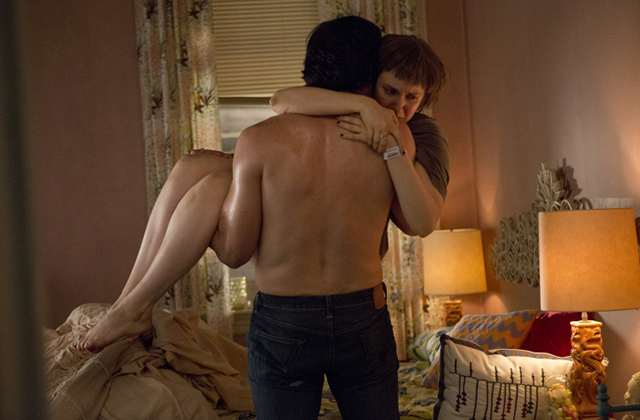The happy ending of Girls was actually very depressing

The season two finale of ‘Girls’ intentionally tried to present an ambiguous ending, but was actually worse than the show realized.
Note: This article contains spoilers for all aired episodes of the show Girls.
The final moments of the second season finale of Girls presented a practically storybook ending, with Adam literally running to the rescue of “damsel in distress” Hannah and lifting her into his arms. A suspiciously pleasant image, but one of deep, dark problems lurking both beneath the surface and right there in your face. Charlie admits he has feelings for Marnie, and while she doesn’t quite reciprocate entirely, she seems legitimately happy to try it again with him. The lone “sad” ending has Roy, who has worked towards actually something approaching ambition, being dumped by Shoshanna. And Jessa is nowhere to be found at all.The threads come together in a blaze of sorrow and confusion.
Lena Dunham has said about the episode that the theme is about “connection and disconnection” — signified by the episode title “Together” — characters finding each other again or coming apart. And everyone’s broken in some way. Charlie can’t get over his entirely surface level attraction to Marnie or his own arrogance and bizarrely strong inverted confidence (by “inverted confidence,” I mean that he doubts himself so much in some ways but seamlessly succeeds in others). His business success seems both connected to legitimate work and a ridiculous amount of luck. Almost a contrived amount, except that it’s obviously overly contrived intentionally. But the primary driving force for Charlie is “don’t stop, just keeping going;” that led to ennui and boredom in his relationship with Marnie before. But one problem they both share is that they are highly uncommunicative. They may talk, but they don’t listen, and they don’t self-reflect. They barely consider the feelings of others at all (although it’s not as bad as some others in the show).
The two are the most physically attractive people in the cast, the least “weird looking” and most conventionally “Hollywood” looking. As for Marnie, she wants what she can’t have, she overly romanticized the mystery in others and she cannot read people at all. Lena Dunham said that although it’s a “complicated gray area” with those two getting back together, it’s hard to convince people Marnie isn’t morally bankrupt or a gold digger. I don’t think she’s a gold digger — I think she just doesn’t know what she wants. The season is ending with their story back where it started in season one — two people who are desperately holding on to the past. Was there too much Booth Jonathan this season? Yes, entirely. Was Charlie’s sudden rise to success purely to make things worse? I think so. But at least those two actually seem to be experiencing adult emotions.
Jessa left in midseason because the actress playing her (Jemima Kirke) was pregnant, but her childishness and clear lack of understanding of how relationships function made it easy to have her just disappear. So when she showed up as just a disembodied voice that always said the same thing and never responded, it was a metaphor for her entire character. The other characters may be better off that she’s no longer around, despite Hannah wanting someone to talk to about her bad haircut. But if she was available, what could she possibly have said? “Oh, you look awful. You should get it fixed.” Surface all the way. Her story has always been the weakest, and although there have been decent subplots, her insufferability eventually became tiresome. She became the person to compare and contrast with Hannah, but this was so muddled and confusing it was hard to know what we were supposed to think or feel.
Hannah was broken and collapsed under her own weight. Her stress and worries about her potentially huge creative job just led to her being more and more insular. When she only had a day left to write, she literally hid from everyone else. A bit silly. That’s the thing about this show: it’s ostensibly a comedy, but it really isn’t. It’s a modern Shakespearean tragedy. The first time I heard “I was always here” I was confused — was I supposed to feel good about it? I thought I was, but then I watched the scene again, and then a few more times. Every time it got scarier and more sad. But Lena Dunham has said that she was the first step for Hannah’s recovery, which to me seems like a misunderstanding of the situation. Yes, these two are broken and matched in their problems. But is an equitable relationship even possible or is it dangerous to imply it? As much as Lena Dunham might decry it, she herself has presented this scene as Adam “getting his woman.” It’s hard to find romance in that, given that at the beginning of the season, Adam was being treated like and acting like a stalker. He still sort of has been. It all just seems doomed for pain. And the “visual signifier” of Hannah’s descent being a loss of hair wasn’t as clever as the show was hoping.
This show is befuddled mess at times, but I still kinda like it. I strongly dislike most of the characters, but I’ve become invested in their struggles, which tends to be sign that something’s going well. I’m just not sure Lena Dunham really knows what she’s doing.
 CliqueClack
CliqueClack

